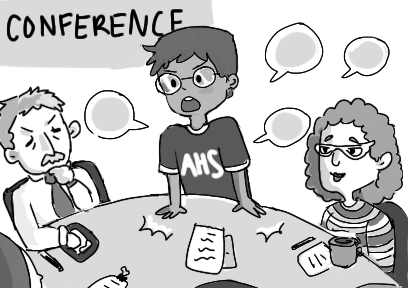No Education Without Representation
KENNY SITU & JANET YU
STAFF WRITERS

The Romans, John Locke and even the United States all shared one idea: that people should have rights and that the government should represent the citizens. However, this autonomy is limited for students, who are told what classes they must take. Regardless, students can mature into leaders in the school environment. Thus, if students had a bigger say in school decisions, they would ensure that their voices are heard in school affairs.
Although students can participate in spirit weeks and student councils, they have little influence in rules and classes. Yet students could offer different insights than staff. If schools took students thoughts and opinions into consideration, they would no longer be limited to just what their teachers think. For instance, if there is a problem with low passing grades at a school, a representative for the students could contact teachers and offer their ideas on how to improve the school environment in order for students score better and excel in their studies. As Professor Russell Quaglia, founder of the Quaglia Institute for Student Aspirations and author of Student Voice: Instrument of Change would describe it, students are the missing piece to reform schools. Having more input would allow students to give back before they graduate.
Additionally, students gain leadership skills from having more of a voice in school decisions. Granting them more authority would save more time and put less stress on the school. For example students can start a program that teach kids who are struggling with their classes. They could teach it easily since they had learned the material and it would help the kids review for the tests. These groups would allow students to communicate better as they require a lot of communication. With the skills taught in schools, they can be trusted to make reasonable decisions regarding academics and extracurriculars.
With all these benefits, students should be able make more decisions at school. Similar to the Declaration of Independence, Locke’s beliefs of equal representation should be implemented in schools around the world. This will help both sides: the school and the student because of the resources the students provide and the experience the school can teach.